Parectypodus
Parectypodus (meaning "besides Ectypodus") is an extinct genus of mammals that lived from Late Cretaceous (Maastrichtian) to Eocene time in North America. It is a member of the extinct order of Multituberculata, suborder Cimolodonta, family Neoplagiaulacidae. It was named by G.L. Jepsen in 1930.
| Parectypodus | |
|---|---|
| Scientific classification | |
| Kingdom: | Animalia |
| Phylum: | Chordata |
| Class: | Mammalia |
| Order: | †Multituberculata |
| Family: | †Neoplagiaulacidae |
| Genus: | †Parectypodus |
| Species | |
| |
Species
- Parectypodus armstrongi (Johnston, P.A. & Fox, R.C., 1984). From the Puercan (Paleocene) Ravenscrag Formation, site Rav W-1, Saskatchewan, Canada. This specimen resides in the collection of the University of Alberta.
- Parectypodus foxi (Storer, J.E., 1991). This Maastrichtian (Late Cretaceous)-age species from the Frenchman Formation of Saskatchewan is estimated to have weighed about 80 g.
- Parectypodus laytoni (Jepsen, G.L., 1940; Sloan, R.E., 1966), also known as Ectypodus laytoni (Jepsen 1940). Remains are known from the Lower Tiffanian (Middle-Late Paleocene) Princeton Quarry, Wyoming (United States). This species has been cited as a descendant of P. sinclairi. It is a small species, having a weight of perhaps 10 g.
- Parectypodus lunatus (Krause, D.W., 1982), also known as P. childei (Kühn, 1969). From the Wasatchian (Lower Eocene) Pocket Quarry of Colorado and Wyoming. This is a late species, having a weight of about 35 g.
- Parectypodus simpsoni (Jepsen, G.L., 1930). Eocene.
- Parectypodus sinclairi (Lamb, 1902; Clemens, 1964a). Known from the Puercan-Torrejonian (Paleocene) of Gidley Quarry, Montana, Wyoming, and Alberta, Canada. This species has been cited as having been derived from Mesodma formosa. It is a smaller species of about 15 g.
- Parectypodus sloani (Schiebout, J.A., 1974). Fossils of this species have been found in the Torrejonian (Paleocene)-age beds of Big Bend, Texas.
- Parectypodus sylviae (Rigby, J.K., 1980; Sloan, J.E., 1987) (=Ectypodus aphronorus (Sloan 1987), P. pattersoni (Sloan 1987)). Remains are known from the Torrejonian (Paleocene)-age Swain Quarry of Montana and Wyoming. The body weight of this species has been estimated as 15 g.
- Parectypodus trovessartianus (Cope, E.D., 1882; Van Valen & Sloan, 1966). From the Puercan-Torrejonian (Paleocene) of the San Juan Basin, New Mexico. The body mass of this species has been estimated to have been around 90 g.
- Parectypodus vanvaleni (Sloan, J.E. 1981). From the Puercan (Paleocene) of the San Juan Basin, New Mexico.
References
- Jepsen, G.L. (1930), "New vertebrate fossils from the lower Eocene of the Bighorn Basin, Wyoming". Proc. Am. Phil. Soc. LXIX, p. 117-131.
- Jepsen, G.L. (1940), "Paleocene faunas of the Polecat Bench formation, Park County, Wyoming". Pro. Amer. Philos. Soc 83, p. 217-340, 21 figs., 5 pls.
- Johnston, P.A. and Fox, R.C. (1984), "Paleocene and Late Cretaceous mammals from Saskatchewan, Canada". Paleontogr. Abt. A: Paläozool., Stratigr 186', p. 163-222.
- Kielan-Jaworowska, Z. and Hurum, J.H. (2001), "Phylogeny and Systematics of multituberculate mammals". Paleontology 44, p. 389-429.
- Simpson (1935), "New Paleocene mammals from the Fort Union of Montana". Proc. US Nation. Museum 83, p. 221-244.
- Schiebout, J.A. (1974), "Vertebrate paleontology and paleoecology of Paleocene Black Peaks Formation, Big Bend National Park, Texas". Texas Memorial Museum Bull 24: 1-87.
- Storer, J.E. (1991). The mammals of the Gryde local fauna, Frenchman Formation (Maastrichtian: Lancian), Saskatchewan. Journal of Vertebrate Paleontology 11(3): 350-396.
This article is issued from Wikipedia. The text is licensed under Creative Commons - Attribution - Sharealike. Additional terms may apply for the media files.

